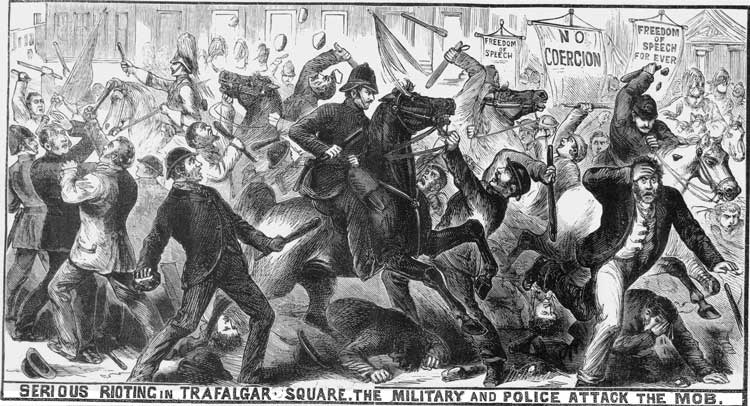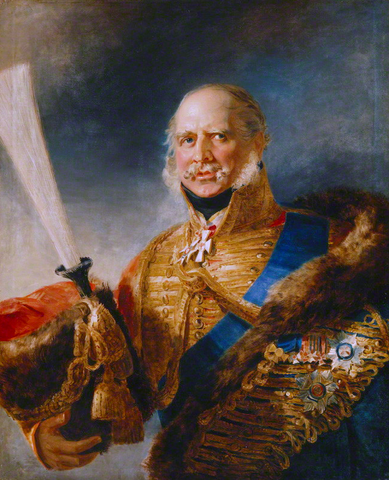I remember that death. I’d just like something a bit more appropriately dark for this version. Maybe lynched by the people he helped oppress. Or crushed to death by one of his stole inventions
You are using an out of date browser. It may not display this or other websites correctly.
You should upgrade or use an alternative browser.
You should upgrade or use an alternative browser.
"What Madness Is This?" Volume I: The Union Forever
- Thread starter Napoleon53
- Start date
Threadmarks
View all 142 threadmarks
Reader mode
Reader mode
Recent threadmarks
THE 2019 MADNESSVERSE HOLIDAY SPECIAL: "IT'S PATRIOT-SAINTS DAY, ZAP ZEPHYR!" THE BIGGEST HOSTAGE OF ALL "THE WHOLE WORLD HEARS YOU!" OSWALD: AUTHOR OF HIS OWN DESTINY THE GREAT EUROPEAN SCHISM: RISE OF THE NEW HOLY ROMAN EMPIRE IN A "SAFE" PLACE THE SUMMER OF '37: THE OLD HOMESTEAD ROUNDERS: THE WORLD SPORTAeroTheZealousOne
Monthly Donor
Trokiism
This was definitely very intentional. It sounds like a Trotsky expy, except it isn't.
Really, in the greatest irony of all, the closest thing I could find OTL to Beutelism is...
...Anarcho-Fascism.
Yup. The main opponent of tyranny and most famous free-thinker ITTL is, at least to a degree, a fascist.
What that actual...? I do love me some irony, but wow.
And two chapters right after another, no time to react! Not that updates are a bad thing, but more delicious dystopia, yeah! Though I must comment that the aim of these anarchists are so bad a Stormtrooper could shoot better than them.
And now I feel the need to defend the good name of our beloved Troopers.Though I must comment that the aim of these anarchists are so bad a Stormtrooper could shoot better than them.
AeroTheZealousOne
Monthly Donor
I'm still right about the better aim of the Stormtroopers but it's not as the butt of the joke anymore.
Touché, man.
“I see you’re trying to create a liquidation order for an Inferior ghetto. Would you like help formatting that?”Aah! An even more evil form of Clippy!
SuperZtar64
Banned
"The Anarchists are a one-trick pony nearing the end of its life. They may bomb us and shoot us, but their violence shall be their own undoing in due time."
- Napoleon II, probably.
NOTE: the term "one-trick pony" was not used in this sense until 1980 but you know fuck it
That would be too fair and karmic.
- Napoleon II, probably.
NOTE: the term "one-trick pony" was not used in this sense until 1980 but you know fuck it
No, no, no. This simply would not do at all.I remember that death. I’d just like something a bit more appropriately dark for this version. Maybe lynched by the people he helped oppress. Or crushed to death by one of his stole inventions
That would be too fair and karmic.
Last edited:
Snip
American Indochina? It seems that either China will be the underdog fighting an uphill battle for much of the late-19th and 20th centuries, or, if Napoleon53 is truly like his namesake, he shall take a rather unexpected route regarding the topic of an Asian power... Considering the nature of this wonderful timeline, I am certain that he can pull it off.
American Indochina? It seems that either China will be the underdog fighting an uphill battle for much of the late-19th and 20th centuries, or, if Napoleon53 is truly like his namesake, he shall take a rather unexpected route regarding the topic of an Asian power...
Until I see it actually happen, I'd count American Indochina as a red herring to throw off of the real trail.
CHAPTER 27
CHAPTER 27
THE ENGLISH REVOLUTION

Princess Victoria is greeted by her husband Prince Alexander II of Russia upon her arrival in St. Petersburg
By 1842, the situation in England was untenable. Ever since the deployment of French Imperial Guardsmen in London to protect King Edward, the English Royalty was on its last knees. The ancient regime of England was a powder keg primed to explode at any second. Since 1835 or so, numerous riots had broken out into armed conflict with Royal and Imperial soldiers firing on civilians. The English economy was among the worst in the continent, leading to it being dubbed the "Sick Man of Europe."THE ENGLISH REVOLUTION

Princess Victoria is greeted by her husband Prince Alexander II of Russia upon her arrival in St. Petersburg
When Princess Victoria married Alexander of Russia in 1840, this was the last straw for many Englishmen. Not only were French troops in their capital supporting a hated monarch, but now their princess had married the heir of the Russian Empire. As discussed before, Napoleon II considered halting the marriage as he saw it as an enormous train wreck headed for English civil war, but he backed out at the last minute. The wedding was unparalleled in European history. Such a bizarre union was just unheard of. Unsurprisingly, the English population was upset. King Edward VII was in his 70s and expected to die soon and Victoria was one of the most unpopular figures in English history. She seemed to be doing what she wanted and not what was good for the country.
But 1842 brought about an unbelievable turn of events. Edward died in his sleep on July 20, leaving the throne to his daughter, the Russian Consort. Victoria had become increasingly distant with her own English family and was spending much of her time in St. Petersburg with her husband. Now, she officially announced she was abdicating all responsibilities as the English monarch and moving to Russia. Overnight, the English monarchy, so long on the rocks, collapsed. Angry mobs besieged Buckingham Palace, shouting "Death to the Romanovs! Death to the Traitor-Queen!" and throwing firebombs at the soldiers trying to keep everything together. As Victoria made her escape with the help of Russian marines, the entirety of Buckingham lit up like a firework. As the Russian steamer slogged down the Thames, Princess Victoria looked back at the final destruction of the English monarchy. Interestingly enough, she and her husband had been planning this abdication for some time it seems. She was deeply in love with Alexander and had no desire to reign over her unwilling subjects. This much was never known to the general populace though.

Newspaper depiction of the revolutionary riots in London

Assassins attempt to ambush the fleeing Princess Victoria

The mobs break through into Westminster Palace
By mid-August, much to the Bonapartes' chagrin, the rioting had spilled over into Wales and Cornwall. "England Now and Forever Free" and "England United Again" were the rallying cries of the mobs. Nobility were running for their lives and Parliament completely gave up and set up a government in exile in Scotland, with Ernest Augustus, King Edward's younger brother and fifth son of George III, as pretender to the throne. Before long, however, even Scotland became to anti-Royal for him, leaving him without a country. The Prussian King extended a hand of friendship in respect of their shared heritage and offered the title of King of Hanover to Ernest Augustus. The Pretender accepted and arrived in later 1842, bringing with him thousands of Royalists and the Parliament-in-Exile. Napoleon II accepted this situation and allowed Hanover to join the Confederation of the Rhine. While both Napoleon II and Friedrich Wilhelm III desired to place Ernest back on the English throne, he would never sit upon it. From Hanover, Ernest Augustus tried to wage a civil war, a Fourth English Civil War. The Royalist faction, while often called Ernestites, was not united behind Ernest entirely.

Ernest Augustus, self-styled King Ernest Augustus I of England, King of Hanover

Augustus Frederick, Duke of Sussex, self-styled King Frederick I of England
Simplifying things somewhat was the heart-attack death of the Duke of Sussex in early 1843, leaving the title of Pretender to the Ernest indisputably. Many claimed the stress had killed the Duke, and his brother wouldn't be far behind him. Frantically and fearing death before victory, Ernest sailed for England in March with some 40,000 troops to retake the throne. He first arrived in French Cornwall, where Napoleon gifted him the region to secure his place on the island. As new spread of his return, the English rebel groups united to push him back. In early April, he made a drive for London. A devastating battle ensued, with thousands dead on both sides. In the end, Ernest's troops entered Westminster, where the rebels had set up the "National Revolutionary Committee" and declared it illegal and void. For twenty days, Ernest held Westminster, fighting off wave after wave of counter-assaults. On April 27, rebel forces broke through and decimated his forces for the final time. With one last window of escape open, Ernest fled to the Thames where French ships were ready to sail him back to Europe. He barely escaped with his life. Rebel forces took Cornwall and brought it back into England. Napoleon was furious and quickly was thinking of how to handle the situation.
The English Revolution was now essentially over. After the last Royalist forces withdrew from England, the revolutionary government quickly turned to the anarchist communes and destroyed them, as one of their biggest fears was a total invasion by all the powers of Europe if they were thought of as anarchists themselves. In actuality, most all the revolutionaries were right-wing "Radical Republicans" who had more in common with the values of the Republican Union than anything else. They saw the destruction of their once great country as a threat to the Anglo-Saxon race itself and viewed France and the Bonapartist empire as a liberal and Catholic conspiracy for world-domination. Not long after that, Reverend Milo Miles, the infamous AFC minister, arrived in England with some 10,000 AFC followers formed into "Fundamentalist Volunteer Brigades." These Brigades had seen action in the Subjugation of Vermont and the Mexican War, and they did not fight for pay or reward, but rather out of unceasing devotion to the Church and to the Anglo-Saxon race.

Reverend Milo Miles pledges his loyalty to the international family of Anglo-Saxon Christians (interestingly enough, standing besides the English redcoat is a young Ambrose Burnside, while a 34 year-old A. A. Lincoln sits at Miles' feet)

General George Brown (seated, center) discusses matters with his staff in this earliest wartime photograph ever taken
In frustration, Napoleon II was forced to abandon Cornwall to England, fearing trying to take the region back might result in a full-on war with England and possibly the Republican Union. While it didn't look very good to the general Imperial public, it was the only thing that really made sense. If he had tried to retake Cornwall, he would have to raze all of England just as his father had done decades earlier. If he razed all of England, an English warzone would become a non-stop money-pit and butcher shop to grind up his finest soldiers. Already, too many of France's sons had died trying to protect the English royals. No, he would rather face a small defeat than a never-ending slaughter.
Flag of the Commonwealth of England
Meanwhile, Victoria was welcomed with open arms in the Russian Empire. Crown Prince Alexander II, her husband, was overjoyed when she and their son Victor formally converted to Russian Orthodoxy. They were remarried in style in St. Petersburg, in an official Orthodox ceremony. England and the world would never be the same. The Crown Jewels were seized in London and the English monarchy abolished forever....
Last edited:
AeroTheZealousOne
Monthly Donor
The English economy was among the worst in the continent, leading to it being dubbed the "Sick Man of Europe."
Like that Troki fellow, I've heard this somewhere before. Not sure where, but it rings a bell.
Victoria was one of the most unpopular figures in English history.
I'm going to need another moment to appreciate the ahistorical irony of this occurrence.
After the last Royalist forces withdrew from England, the revolutionary government quickly turned to the anarchist communes and destroyed them, as one of their biggest fears was a total invasion by all the powers of Europe if they were thought of as anarchists themselves. In actuality, most all the revolutionaries were right-wing "Radical Republicans" who had more in common with the values of the Republican Union than anything else.
[insert long, explosive, and very audible tirade of expletives here]
Before I continue, how is the Republican Union gonna feel about the Brits turncoating towards a more favorable government style? I mean, they did raze half of Boston and much more.
This is going to end very well for everybody involved. Very very nicely.
{Sarcasm Self-Test Complete}
Before I continue, how is the Republican Union gonna feel about the Brits turncoating towards a more favorable government style? I mean, they did raze half of Boston and much more.
This is going to end very well for everybody involved. Very very nicely.
{Sarcasm Self-Test Complete}
I would say that since the beginning the Union's hatred has been more directed toward the allies that left them high and dry and on Canada than on England itself. Also, they see monarchy as evil and they see the English Revolution as the Anglo-Saxon people rising up against their Bonapartist puppet-masters and standing for "family, faith, and freedom." Also, it's a way to absolutely screw with France. With England no longer in their control, the power of Napoleon II isn't as secure. He needs to be on the offensive from this point out.
So basically, no matter how xenophobic the Union may be, they can't deny their shared heritage with the English, who hate France and Ireland just as much as they do.
Why happening in Ireland and the new exile Scotland government?
Ireland is probably really on edge about the rise of English nationalism once again. The English Royal Government-in-Exile evacuated Scotland and is now based in Hanover with good Koenig Ernst as their Pretender until he croaks. The House of Hanover will likely be like the House of Stuart, just kind of floating out there for years, intermarrying with other families until they get googled and people say, "Huh, they still are around?"
The ghost of Cromwell looms over England....
Don't be surprised if "Patriot-Saint Cromwell" becomes the "Founding Father" of English fascism long after his own death.
Don't be surprised if "Patriot-Saint Cromwell" becomes the "Founding Father" of English fascism long after his own death.
At this point, I would be surprise if that didn't happened.
Threadmarks
View all 142 threadmarks
Reader mode
Reader mode
Recent threadmarks
THE 2019 MADNESSVERSE HOLIDAY SPECIAL: "IT'S PATRIOT-SAINTS DAY, ZAP ZEPHYR!" THE BIGGEST HOSTAGE OF ALL "THE WHOLE WORLD HEARS YOU!" OSWALD: AUTHOR OF HIS OWN DESTINY THE GREAT EUROPEAN SCHISM: RISE OF THE NEW HOLY ROMAN EMPIRE IN A "SAFE" PLACE THE SUMMER OF '37: THE OLD HOMESTEAD ROUNDERS: THE WORLD SPORT
Share:

